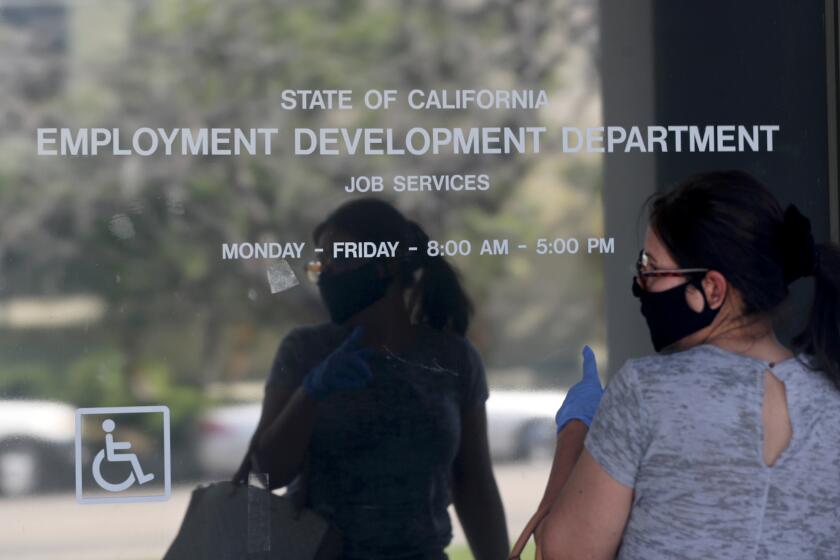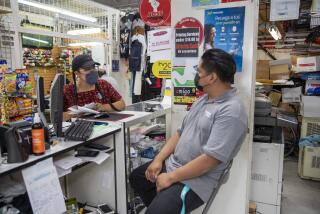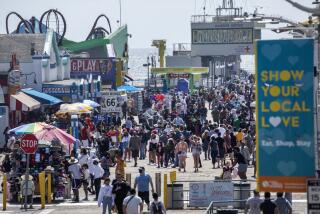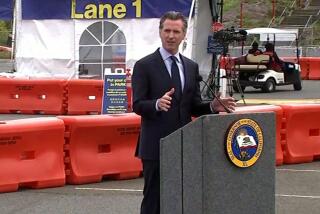California reopening speeds up even as state hits 100,000 confirmed coronavirus cases
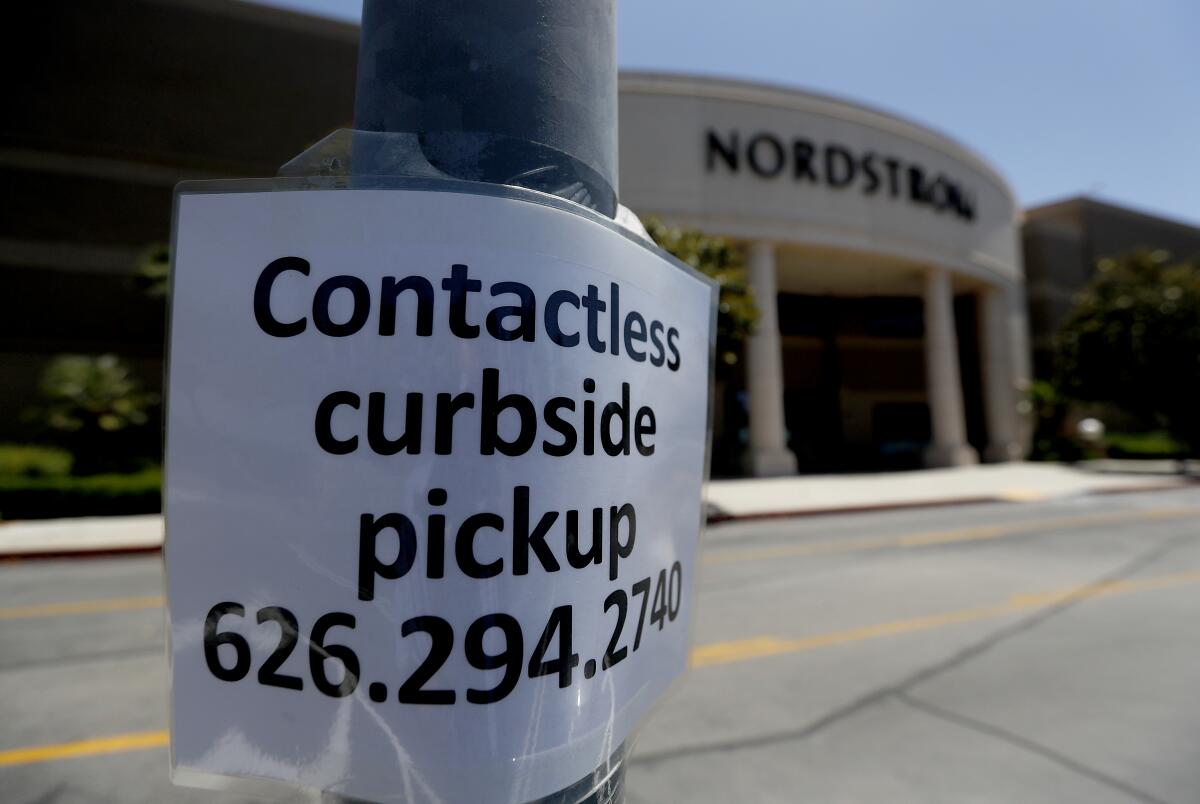
- Share via
SACRAMENTO — Even as California surpassed 100,000 confirmed coronavirus cases on Wednesday, many communities continued to push forward with reopening the economy with the hope that social distancing and other safety measures would prevent new outbreaks.
From barber shops to shopping malls to restaurants, many businesses shuttered for months began to come back to life this week as government officials rapidly lifted stay-at-home orders that helped slow the spread of the novel coronavirus.
Gov. Gavin Newsom said Wednesday that a decision on reopening gyms and fitness centers could be coming soon, another milestone. In San Diego, Seaworld, Legoland and other tourist attractions began talking with local officials about a potential July 1 reopening.
In Los Angeles, the signs of rebirth were both big and small.
The Los Angeles Archdiocese plans to begin gradually reopening churches, with measures to prevent crowding and physical contact, as soon as next week. The wildly popular — and photographed — Runyon Canyon Park has reopened, with additional measures in place to prevent the spread of the coronavirus. Park officials have reduced how many people can enter at one time, installed cameras and electric counters to monitor crowds, added additional staff and converted the trail into a one-way loop.
But the question remains about how quickly people will feel comfortable returning to any park, church or business. And health officials stressed that without masks, social distancing and crowd control, the reopened economy could result in new infections.
“There is a lot at stake as we reopen,” Los Angeles County Public Health Director Barbara Ferrer said. “More people being around one another can result in more transmission of COVID-19, which is ... likely more hospitalizations and deaths. This is why it couldn’t be more important for us to take care of each other when we’re out of our homes.”
California is the fourth state to surpass 100,000 confirmed cases. New York leads with more than 300,000 cases. California has recorded more than 3,800 deaths, far fewer than New York, which has 29,000; New Jersey, which has 11,000; and Massachusetts, which has recorded 6,400.
The rising case numbers don’t necessarily mean outbreaks are spreading. California has dramatically increased testing, which some officials credit for the rise in confirmed cases.
The state recorded 3,215 new coronavirus infections Tuesday — the most reported in a single day since the onset of the pandemic, and a spike that officials attribute to a lag in reporting over the holiday weekend.
“We’ve basically wiped out a decade worth of job creation in a month and a half,” an economist says. May’s unemployment figures will probably look even grimmer.
About 57% of those new cases were reported in Los Angeles County, which has struggled as the setting for an outsized number of infections and deaths statewide. L.A. County health officials also reached a new daily record Tuesday, reporting 1,852 new cases of COVID-19.
On Wednesday, L.A. County health officials reported 933 new cases of COVID-19, pushing the region’s total number of infections to 48,700. The county also reported 53 new virus-related fatalities, bringing its death toll to 2,195.
Ferrer said the decline in COVID-19 deaths and hospitalizations as well as the county’s rate of infection per 100,000 people signal to her that the region is ready to move ahead with reopening, albeit with regulations.
Newsom on Wednesday said his administration will release guidelines “in a week or so” for allowing gyms, yoga studios and other fitness facilities to reopen, though stringent safeguards will need to be adopted to protect customers.
Sign up for Essential California
The most important California stories and recommendations in your inbox every morning.
You may occasionally receive promotional content from the Los Angeles Times.
Newsom cautioned that the state directives will be tailored to the unique characteristics of each business, from large fitness chains to small studios, and will rely heavily on the advice of public health officials in each county.
The governor made the comments during an online roundtable with fitness professionals and business owners Wednesday morning, saying he hopes to allow them to be back in business as soon as possible.
“We also recognize your sector is multifaceted and we don’t want to be naive and just put out something that’s bland and that doesn’t meet your unique criteria and your unique considerations,” Newsom said.
He said that 47 of California’s 58 counties had met the state’s regional standards to ease his stay-at-home order, which include preparations to increase hospital capacity, testing and supplies of personal protective equipment. That has allowed retailers in most of the state to open, as well as hair salons and barbershops.
The governor‘s chief of staff, Ann O’Leary, said that the draft guidelines to reopen the fitness industry are being reviewed by state public health officials and that she expects those directives to be released within a week.
Adam Attia, owner of Fitness Rangers in Sacramento, told the governor that the closure, put in place in March to stem the spread of the coronavirus, has been financially and personally devastating. He told Newsom that he needs to reopen soon — within a week or so — if he hopes to stay in business.
“We’re desperate. We want to go back into the gym. We’re doing everything we can to keep our members engaged,” Attia told Newsom during the meeting, which streamed on YouTube. “We’re at a point where I’m going to have to lay everyone off. I may have to close my doors permanently if we can’t reopen soon. We really need your support.”
Francesca Schuler, chief executive of In-Shape Health Clubs, also emphasized how essential the fitness industry is to Californians.
“We’re one of the only industries that’s really in preventive healthcare of the community so impacted by COVID-19. Many of them are individuals who struggle with chronic illnesses, usually, diabetes, high blood pressure,” Schuler told the governor.
Willon reported from Sacramento, Fry from Los Angeles. Times staff writers Luke Money and Cindy Chang in Los Angeles contributed to this report.
More to Read
Sign up for Essential California
The most important California stories and recommendations in your inbox every morning.
You may occasionally receive promotional content from the Los Angeles Times.
